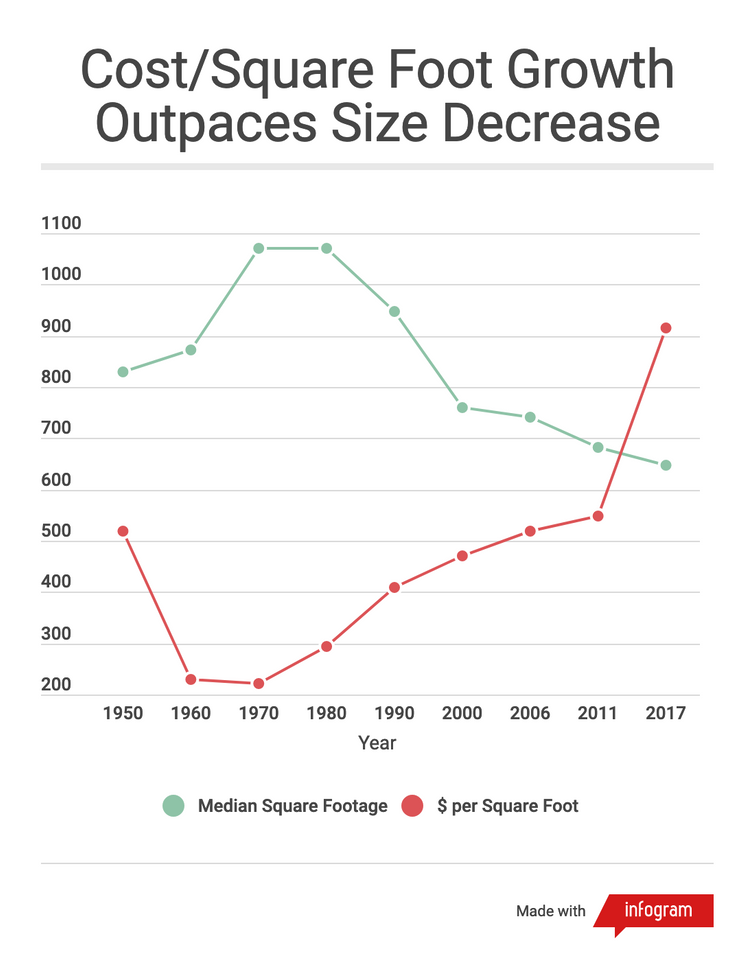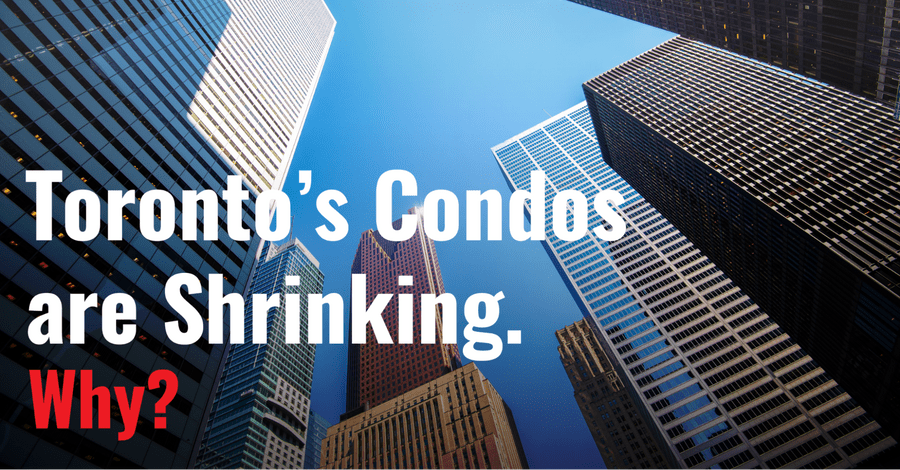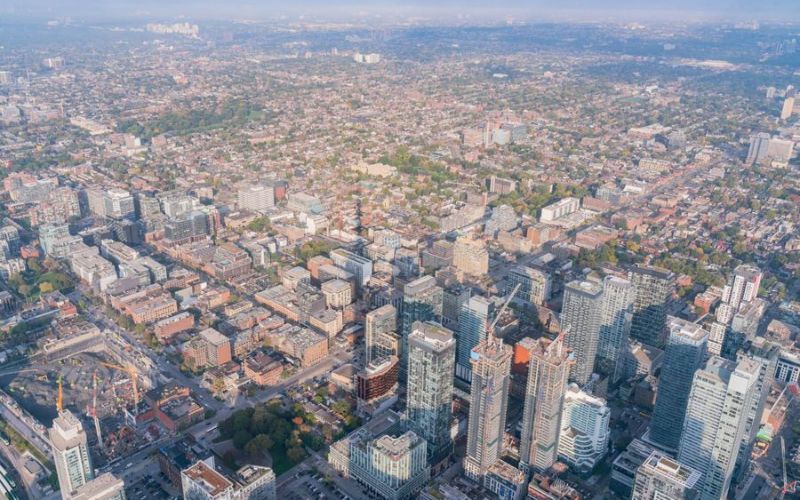Last Updated on October 24, 2023 by Corben Grant
As the population of the City of Toronto grows, more people than ever are looking for a place to stay in the city. Data from Statistics Canada and Royal LePage indicate that in recent years, the square footage of Toronto condos has been shrinking at an arming rate.
Meanwhile, the median price per square foot of Toronto condos is up. So a shrinking in size doesn’t necessarily mean prices are getting more affordable either.
In this article, we will discuss some reasons why condos may be shrinking and why the median price per square foot is rising. We will also look at average prices and sizes you can expect in Toronto and how they compare to other cities across the country.
Toronto condos smaller than 90s peak, continuing to shrink
According to Statistics Canada, the square footage of Toronto condos reached a peak sometime in the early 1990s.
From the 1990s until 2017, the median square footage of Toronto condos shrunk by almost 40%. Between 2015 and 2017 alone, the median size of condo units in Toronto fell from 681 square foot to 647 square foot, a decrease of about 5%.
Compare this to the average size of single family detached homes in Toronto, which actually increased over the same period. The median price per square foot of single family detached homes also remained more or less stable over the same period, while median price per square foot in condos grew rapidly.
Though houses are broadly more expensive, they also offer a larger living area and more space for families. However, detached homes are not popular as entry level properties as first-time home buyers find it far easier to pay condo prices.
In comparison, Toronto condos are shrinking faster than those in other cities like Vancouver. Compare this to the notoriously small condos of the greater Vancouver area, which only saw a 16% in size reduction over the same period from 1990-2017.
Price per square foot growth in condo units outpaces reduction in size over the same period
Another important statistic when considering the size of Toronto condos is the price per square foot. While Toronto condos have been shrinking, the median price per square foot has increased.
According to Royal LePage the median price per square foot of a Toronto condo was $743 in 2019. The average in 2021 has already risen to over $900 per square foot, with over $1000 per square foot becoming the new norm in some areas.

Assuming two condos of the same price, one smaller and one larger, the smaller one will obviously cost more per square foot. This means that if the average price stays the same, price per square foot may increase a small amount in proportion to the decrease in size. This is not the case however.
A condo built in those same years from 2015- 2017 not only saw a decrease in size by 8%, but also an increase of price per square foot of more than 55%. Condo apartments are getting smaller while at the same time, we are paying more for a smaller living area.
“I think it mainly has to do with end prices, and that’s why the price per square foot is such an important metric.” said Ryan Coyle, an investor and founder of Connect.ca “For example, a one bedroom might be $600,000 in one building, but it might be $100,000 in another building. So if you’re looking at just one bedroom versus one bedroom, there’s a huge price difference, but if the per square foot price in the $600,000 unit is much lower than in the other, then you’ve got one really large one bedroom versus a really small one. That’s why an apples to apples comparison is always price per square foot. So the reason why developers have shrunk units is, because the price per square foot continues to go up, a one bedroom can’t go all the way up to a million in a short period of time. But if it shrinks, the price per square foot can go up.”
Condo apartments more popular than ever
One final fact to consider is the state of the condo market generally. Despite shrinking condos and inflating prices, the volume of actual sales has increased. Even with a higher price per square foot and smaller unit size, investors are still eager to get in the Toronto real estate market with a condo.
Factors pushing sizes down, prices up
Other factors could be behind this change as well. For example, condos apartments were once seen as substitutes for a family home and were built large with multiple bedrooms. This attitude has changed. Now smaller property types such as single bedroom condo units are far more popular.
In addition, Toronto is more densely populated than ever, and the areas where most condominium developments are located can’t get any bigger. There are two solutions to create higher supply in a limited space. One is to build upwards, which Toronto has been doing for decades now. The other is to increase density. This means more densely populated buildings, which in turn means smaller units but higher supply.
“In any major city where it’s tougher to build and there’s, you know, kind of supply and land restrictions, that developers are forced to build smaller units to be able to get more units to create more housing and more living units.” Said Coyle.
“I believe most of the downtown districts require about 10% of a building to be three bedroom units. If the developer was building 2000 square foot three bedroom units, it would take forever for them to sell them. Because typically, when a new building launches, its investors that are buying that far out, and they’re buying cheaper, smaller units. So the developers are often stuck with their three bedrooms are more expensive units till closer till the end. But if they shrink down those three bedrooms, then they’re a little bit more affordable and they can move faster.”
Supply is a major factor, according to Tom Storey of Royal LePage Signature Realty.
“Low inventory levels are putting upward pressure on price per square foot in the Greater Toronto Area, especially for entry-level properties like condos. Although detached homes hold more value per square foot, condos are more affordable for first-time home buyers in the region given their smaller living space and higher supply,” said Torey.

The younger population in the cities is less concerned with settling permanently and instead see their condo units as a space to live while they work, go to school, and attend social events in the cities. A smaller living space does not matter as much for these busier young people who spend more time out of the house than in it. For them, the location is more important than the square footage. Condos are also attractive for those making their first real estate investment who are willing to deal with a smaller living space if it means getting a foot in the door of the real estate market.
Many new condos have begun taking the form of smaller units, or so called ‘micro condos’. These tiny units come in at under 500 square feet. These smaller units were, at one time, the new hot thing in Toronto. Fast forward to today and a changing landscape resulting from the COVID-19 pandemic means demand for these tiny units has fallen, even with low inventory levels in most other segments.
Families who chose to stay in condo apartments rather than more spacious homes and into more are going to find it harder to find a unit size to accommodate the space requirements of a growing family. This increases competition even in the less popular three-bedroom category.
Nonetheless condos remain popular and this demand is putting upward pressure on condo prices in Toronto.
How Toronto condo apartments compare across the country
Condo prices in Canada’s densely populated and largest cities, are among the highest in the country, however, condo prices vary greatly between cities.
Compared to Vancouver, one of Canada’s most expensive real estate markets, Toronto looks even worse off in the condo market. The average condo in Vancouver is now not only bigger, but also goes for less per square foot.
Similarly, in Ottawa prices and sizes are much more favourable than Toronto, even despite supply issues.
Average Condo sizes and prices
We’ve compiled recent data on average price, price per square foot, and average square footage, to help you understand what you can expect when looking for condo apartments in the city of Toronto.
Values are based on an average across the whole city of Toronto, so actual prices may vary between neighbourhoods For example, downtown Toronto is the most expensive, while condo apartments in areas like North York or Scarborough will get you more value for your money.
This data also does not include the Greater Toronto Area, which will also vary greatly depending on location. Finally, statistics on real estate are hard to find and change rapidly, while this picture is mostly accurate for now, just remember that prices are subject to change.

One Bedroom Condos
A one bedroom condo in Toronto in late 2021 went for an average price of $581,000. The average price per square foot of a one bedroom condo in Toronto was $1,019. By dividing the two, we find an average square footage estimate of about 570 square feet. Average rent for a condo this size was around $1,800 monthly. One bedroom units are the most popularly listed units in Toronto right now.
Two Bedroom Condos
A two bedroom condo in Toronto in late 2021 went for an average price of $772,000. The average price per square foot of a two bedroom condo in Toronto was $843. By dividing the two, we find an average estimate of about 915 square feet. Average rent for condos this size was approximately $2,600 monthly.
Three + Bedroom Condos
This section includes anything three bedrooms or greater, meaning there will be slight variation depending on the number of rooms of the unit. A three + bedroom condo in Toronto in late 2021 went for an average price of $925,000. The average price per square foot of a three + bedroom condo in Toronto was $631. By dividing the two, we find an average estimate of about 1,465 square feet. Average rent for condos this size was approximately $3,400 monthly.
You Need Help From An Investment Expert
If you’re one of the many investors who are not deterred by smaller condos in Toronto and are looking to buy now, why not seek help from an expert who knows the ins and outs of investing in Toronto. See our recent articles on why are a good idea and unexpected fees on closing.
If you are looking to invest in Toronto condos, visit Connect.ca for expert help from some of the city’s top investors, exclusive early access to new condo developments, and more.
Corben joined CREW as a relative newcomer to the field of real estate and has since immersed himself and learned from the experts about everything there is to know on the topic. As a writer with CREW, Corben produces informative guides that answer the questions you need to know and reports on real estate and investment news developments across Canada. Corben lives in Guelph, Ontario with his partner and their two cats. Outside of work, he loves to cook, play music, and work on all kinds of creative projects. You can contact Corben at corben@crewmedia.ca or find him on Linkedin at https://www.linkedin.com/in/corbengrant/.









